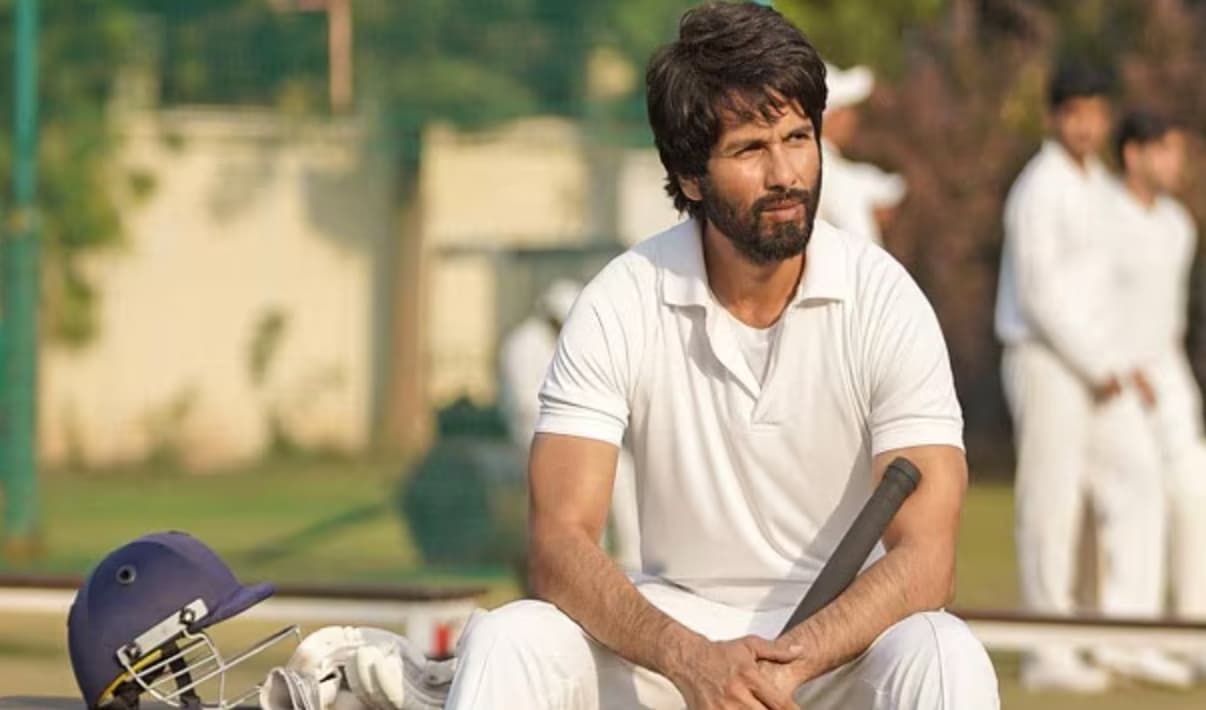The fictional character of Arjun Talwar stands as one of Indian cinema’s most psychologically complex sports protagonists.
Created for the film “Jersey,” first in Telugu (2019) and later remade in Hindi (2022), this 36-year-old cricketer represents far more than another sports hero narrative.
Through Arjun’s journey, audiences witness a profound exploration of identity crisis, fatherhood, redemption, and the psychological toll of unfulfilled potential.
Unlike conventional sports heroes whose journeys culminate in triumphant victory, Arjun Talwar’s story follows a more nuanced trajectory.
His character arc—from promising talent to disgraced player to unexpected comeback sensation—offers a psychological case study in how athletic identity becomes intertwined with self-worth.
When this identity is suddenly stripped away, the resulting void creates ripple effects across all aspects of life.
Arjun Talwar Cricketer

This article examines the psychological dimensions and symbolic significance of Arjun Talwar, analyzing how this fictional character illuminates very real human experiences of failure, resilience, and sacrifice.
By understanding the psychological architecture behind this character, we gain insight into why his story resonates so deeply with audiences beyond cricket enthusiasts.
Character Background and Storyline
Arjun Talwar’s narrative begins with promise unfulfilled. As a talented domestic cricket player, his trajectory toward national recognition was derailed by corruption allegations that resulted in his suspension from government service. Though the film leaves ambiguity around his actual culpability, the consequences were definitive—his cricketing career abruptly terminated.
The story then advances a decade forward, revealing Arjun as a man psychologically adrift. Unemployed and struggling to maintain his dignity, he depends financially on his wife Vidya while battling inner demons of resentment, regret, and diminished self-worth. His relationship with his son Ketan (“Kittu”) represents his one uncomplicated source of joy and purpose.
The inciting incident occurs when Kittu expresses his desire for an Indian cricket team jersey as a birthday gift. This seemingly simple request creates an insurmountable challenge for the financially struggling family. Rather than disappoint his son, Arjun makes the extraordinary decision to attempt a return to cricket at age 36, well past what most consider a cricketer’s prime.
What follows is a physical and psychological gauntlet as Arjun confronts not just external skepticism but his own internalized doubts. Each training session becomes a battle against physical limitations and psychological barriers built over years of inactivity and self-doubt. His journey back to competitive cricket unfolds as both an external sports narrative and an internal psychological reclamation.
The storyline culminates in remarkable success as Arjun’s performances earn him selection to the national team—the ultimate vindication. However, this triumph transforms immediately to tragedy when, just days after selection, Arjun succumbs to a heart condition he had been silently battling throughout his comeback. His son ultimately receives not just any jersey, but his father’s national team jersey—a bittersweet symbol of extraordinary achievement and ultimate sacrifice.
Inspiration Behind the Character
The character of Arjun Talwar draws conceptual inspiration from real cricketer Raman Lamba, who died tragically in 1998 at age 38 after being struck by a cricket ball during a match in Bangladesh. While Arjun’s specific life circumstances and cause of death differ significantly from Lamba’s, both stories share the thematic thread of talent extinguished at its apex.
Director Gowtam Tinnanuri has acknowledged this historical reference point while developing an entirely fictional narrative around his protagonist. This creative approach allowed the filmmaker to explore universal psychological themes while maintaining a connection to cricket’s real-world emotional landscape.
Beyond specific biographical inspiration, Arjun Talwar incorporates psychological patterns observed in numerous athletes facing career extinction:
- The identity crisis occurs when a defining professional role suddenly disappears
- The complicated grief process associated with unfulfilled dreams
- The psychological resilience required to attempt reinvention after public failure
- The motivational transformation that occurs when personal ambition shifts to family-centered purpose
The character also draws from broader psychological research on mid-life transitions and second-act careers. Arjun’s struggle represents the increasingly common experience of professional reinvention necessitated by economic or circumstantial disruption—a psychological journey familiar to many audience members regardless of their connection to sports.
This blending of specific cricket inspiration with universal psychological patterns creates a character simultaneously authentic to his sporting context yet broadly relatable across demographic and cultural boundaries.
Portrayal by Actors
Two acclaimed actors have embodied Arjun Talwar, each bringing distinctive psychological interpretations to the character:
- Nani (Telugu, 2019): Ghanta Naveen Babu, known professionally as Nani, originated the role with a performance characterized by psychological subtlety. His portrayal emphasized Arjun’s internal struggle through restrained expression and physical precision. Nani created a character whose emotional restraint made rare moments of vulnerability exceptionally powerful.
- Shahid Kapoor (Hindi, 2022): In the Hindi remake, Shahid Kapoor reinterpreted Arjun with greater psychological externalization. His performance featured more visible emotional volatility, particularly in scenes depicting Arjun’s frustration and desperation. Kapoor’s approach illuminated the character’s psychological fragility through more demonstrative body language and vocal expression.
Both interpretations required the actors to navigate complex psychological terrain:
- Portraying both younger and older versions of the same character, requiring distinct psychological states
- Conveying the physical and mental toll of athletic competition after prolonged inactivity
- Balancing masculine stoicism with emotional vulnerability in a traditional sports context
- Depicting the psychological transformation from self-focused ambition to parental sacrifice
The table below compares these two psychological interpretations of Arjun Talwar:
| Psychological Aspect | Nani’s Interpretation | Shahid Kapoor’s Interpretation |
|---|---|---|
| Expression of Failure | Internalized, shown through subtle physical withdrawal | Externalized through visible anger and emotional outbursts |
| Father-Son Dynamic | Quiet affection expressed through presence and gentle interactions | More verbally and physically demonstrative affection |
| Athletic Identity | Portrayed as deeply integrated but privately held | Portrayed as publicly performative and externally validated |
| Response to Success | Cautious, almost disbelieving acceptance | Cathartic emotional release |
| Depiction of Illness | Almost imperceptible physical indicators | More pronounced physical deterioration |
These different approaches have given audiences two equally valid psychological portraits of the same character. Film scholars have noted how these interpretations reflect broader cultural differences in emotional expression between Telugu and Hindi cinema traditions, while still maintaining the essential psychological architecture of Arjun Talwar.
Themes and Legacy
The character of Arjun Talwar embodies several profound psychological themes that elevate “Jersey” beyond conventional sports drama:
- Athletic Identity and Self-Worth: Through Arjun’s journey, the film explores how thoroughly professional identity, particularly athletic identity, can become intertwined with self-concept. His initial depression stems not just from financial hardship but from the psychological void created when his defining role is stripped away.
- Masculine Vulnerability: The character navigates complex emotional territory around masculine expression in traditional Indian society. Arjun’s struggle to maintain dignity while financially dependent on his wife, his difficulty expressing emotional needs, and his ultimate transformation through paternal love all challenge conventional masculine archetypes.
- Redemption Through Purpose Shift: Unlike typical sports redemption narratives centered on personal vindication, Arjun finds psychological rebirth by shifting focus from self to son. This transformation suggests that redemption comes not through achievement itself but through the redirection of purpose toward something beyond ego.
- Mortality and Legacy: Arjun’s undiagnosed heart condition introduces the psychological dimension of mortality awareness. His silent battle with physical limitation becomes metaphorical for the broader human condition—the universal struggle to create meaning despite knowing our time is finite.
The legacy of this character extends beyond the films themselves. Arjun Talwar has become a psychological reference point in discussions about:
- Mid-life career transitions and professional reinvention
- The psychological impact of corruption allegations, whether founded or unfounded
- Evolving models of fatherhood in contemporary Indian society
- Alternative frameworks for defining success beyond conventional achievement metrics
Perhaps most significantly, the character has expanded the psychological depth expected from commercial Indian cinema. By presenting a sports protagonist with complex internal life rather than simplistic heroic attributes, “Jersey” has influenced subsequent character development across the Indian film industry.
Arjun Talwar in Popular Culture
Despite existing solely as a fictional creation, Arjun Talwar has permeated popular culture in ways that demonstrate the character’s psychological resonance:
- Psychological Reference Point: Mental health professionals in India have cited Arjun’s character when discussing depression following career disruption and the therapeutic potential of reconnecting with former passions.
- Parenting Discussions: The character frequently appears in media content addressing fatherhood and parental sacrifice, particularly in discussions about balancing personal fulfillment with family responsibility.
- Sports Psychology: Cricket coaches and sports psychologists reference Arjun’s fictional comeback when discussing the mental aspects of returning to competition after a prolonged absence.
- Motivational Contexts: Business seminars and professional development programs invoke Arjun’s journey when addressing themes of resilience and reinvention, particularly for mid-career professionals.
- Social Media Presence: Quotes attributed to the character circulate widely across platforms during challenging economic periods, with his struggle resonating particularly during employment downturns and career disruptions.
What makes this cultural impact notable is that Arjun Talwar has transcended his specific narrative to become psychological shorthand for particular human experiences. Unlike many fictional characters who enter popular culture through catchphrases or iconic visual elements, Arjun’s cultural presence stems from his psychological journey rather than superficial characteristics.
His character demonstrates how fictional constructs can provide frameworks for understanding complex real-world psychological experiences. By giving narrative shape to the amorphous struggles of identity loss, purpose reclamation, and parental sacrifice, Arjun Talwar offers audiences psychological vocabulary for their life transitions.
Psychological Symbolism in Key Objects and Moments
The narrative surrounding Arjun Talwar employs several recurring symbols that deepen the character’s psychological portrayal:
- The Jersey: Beyond its literal role in the plot, the cricket jersey functions as a multivalent psychological symbol. Initially representing an unattainable aspiration, it transforms into motivation, then achievement, and finally memorial, mirroring Arjun’s psychological evolution throughout the story.
- The Cricket Bat: Arjun’s relationship with his cricket equipment evolves symbolically throughout the narrative. His initial reluctance to handle his old bat represents psychological avoidance of past trauma. His eventual reconnection with this tool signals the beginning of psychological integration between past identity and present self.
- Physical Training Sequences: The montages depicting Arjun’s physical preparation serve as external representations of internal psychological resilience. Each training scene visualizes not just physical reconditioning but psychological reconstitution—the rebuilding of confidence and identity through progressive challenge.
- The Heart Condition: Arjun’s undiagnosed cardiac issue functions symbolically as the psychological cost of suppressed emotion and deferred dreams. This physical manifestation of internal distress follows a psychological pattern where unprocessed emotional content eventually demands physical expression.
- Domestic Spaces vs. Cricket Field: The film creates deliberate visual contrast between confined domestic settings and expansive cricket grounds. This spatial juxtaposition symbolizes Arjun’s psychological experience—the suffocating limitations of his current life versus the freedom and possibility represented by his return to cricket.
These symbolic elements create psychological texture beyond explicit dialogue or action. Through careful visual storytelling, the film establishes Arjun’s internal landscape as equal in importance to his external journey, inviting audiences to engage with the character on multiple psychological levels simultaneously.
Frequently Asked Questions
- What psychological conditions does Arjun Talwar exhibit in the film?
While not explicitly diagnosed in the narrative, Arjun displays symptoms consistent with depression following career loss, including withdrawal, irritability, loss of motivation, and identity disruption—psychological patterns often observed in athletes following career termination.
- How does Arjun’s relationship with his wife evolve psychologically?
The relationship transforms from tension caused by financial pressure and Arjun’s diminished self-worth to renewed mutual respect as Vidya witnesses his psychological recommitment to purpose and family welfare, despite her initial skepticism about his cricket comeback.
- What motivates Arjun Talwar’s comeback from a psychological perspective?
His motivation undergoes a critical transformation from ego-based (proving critics wrong) to attachment-based (fulfilling his son’s desire). This psychological shift from self-focused to other-focused motivation proves sustainable even when external circumstances remain challenging.
- How does the film portray the psychological impact of corruption allegations?
The narrative shows how public accusations, regardless of merit, create lasting psychological damage through social stigma, internalized shame, and identity disruption. Arjun’s experience illustrates how corruption allegations affect not just career trajectory but comprehensive psychological well-being.
- What does Arjun Talwar’s heart condition symbolize psychologically?
The heart condition functions as both a literal plot device and a psychological metaphor for the accumulated emotional toll of dreams deferred, representing how psychological distress eventually manifests physically when left unaddressed.
- How do the actors portraying Arjun psychologically prepare for the role?
Both Nani and Shahid Kapoor have discussed immersing themselves in the psychological mindset of failed athletes attempting comebacks. Their preparation included not just physical cricket training but psychological research into sports career transitions and identity disruption.
- What psychological aspects of fatherhood does Arjun Talwar’s character explore?
The character examines the psychological tension between providing financial security versus emotional presence, the transformative impact of parental love on motivation and purpose, and the psychological legacy parents hope to leave their children beyond material provision.
- Does Arjun Talwar exhibit signs of psychological resilience?
Yes, the character demonstrates key components of psychological resilience: maintaining core purpose despite setbacks, adapting to changed circumstances, drawing strength from meaningful relationships, and finding new pathways toward goals when original routes are blocked.
- How does Arjun’s psychology differ between the Telugu and Hindi versions?
The core psychological architecture remains consistent, but Nani’s portrayal emphasizes internalized psychological struggle expressed through subtle physical indicators, while Shahid Kapoor’s interpretation features more externalized psychological expression through visible emotional displays.
- What psychological message does Arjun’s death convey?
His death subverts the conventional psychological satisfaction of sports triumph, suggesting that true fulfillment comes not from achievement itself but from the purpose behind that achievement. This bittersweet conclusion offers a more complex psychological framework for evaluating life success.
Also Check:
Conclusion:
Arjun Talwar represents a significant achievement in psychological character development within sports cinema.
Through this fictional cricketer, filmmakers have crafted a protagonist whose journey illuminates universal psychological experiences of identity loss, purpose reclamation, and parental sacrifice.
The character’s psychological complexity elevates “Jersey” beyond typical sports drama conventions.
Rather than presenting another simple narrative of triumph over adversity, Arjun’s story explores the more nuanced territory of how athletic achievement intersects with psychological well-being, family dynamics, and existential purpose.
Perhaps the most profound aspect of Arjun Talwar’s characterization is how thoroughly it subverts traditional sports narrative psychology.
Instead of finding redemption through personal glory, Arjun achieves psychological wholeness by transcending ego-driven ambition in favor of paternal sacrifice.
This transformation suggests a more mature psychological framework for defining success—one measured not by trophies or accolades but by what we give rather than what we gain.
As both Telugu and Hindi versions of “Jersey” continue finding new audiences, Arjun Talwar’s psychological journey offers viewers a rare opportunity for reflection on their own relationships with professional identity, personal failure, and family legacy.
In this capacity, the character fulfills the highest purpose of fictional creation—providing a psychological mirror through which we might better understand our own human experience.








